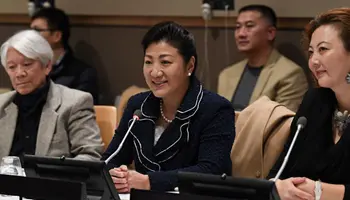Plans to ease the banning of Japanese food imports in Taiwan have triggered violence on the island amid growing public anger and distrust of the approval procedure of the island's leadership.
Since Saturday, violence has erupted at 10 public hearings around the island on whether to lift the ban on food imports from five prefectures in Japan that were contaminated with radiation after the 2011 Fukushima nuclear disaster.
At a public hearing in Kaohsiung on Saturday, tables were overturned and people were heard shouting that the government was turning a blind eye to public health and holding rushed hearings due to a secret deal with Japan.
The hearing was suspended amid protests and violence.
In Hualien, bloody violence erupted 30 minutes after a hearing began on Monday. There were also violent protests in Taoyuan, Xinbei, Taichung and Taipei.
Taiwan's authorities banned food imports from Japan's Fukushima and nearby Ibaraki, Gunma, Tochigi and Chiba prefectures after the 2011 Fukushima nuclear disaster, which was triggered by a huge earthquake and tsunami.
Last year food products, with false origin labels, made near Fukushima nuclear power plant were found to illegally have entered the island. Taiwan authorities demanded that Japanese food exporters submit their origin credentials.
After the Democratic Progressive Party (DPP) came to power in May, it announced a two-stage proposal stating that Taiwan plans to keep a ban on the import of food from Fukushima but conditionally allow imports of certain products from four other Japanese prefectures.
The implementation of the first stage of the plan was to serve as a reference for the further relaxation of the restrictions in the second stage, possibly about six months later.
Last Thursday, amid growing public complaints, the DPP abruptly announced plans to hold ten public hearings in the following three days. Taiwan's law stipulates that plans for public hearings should be announced 10 days before hearings are held.
A survey conducted by the opposition nationalist party has shown 74.6 percent of the public do not want the restrictions lifted.
On Monday an editorial in the China Times, a leading newspaper in Taiwan, censured the DPP for not checking the safety credentials of Japanese food or having a management plan for future imports.
Local legislators, including in Taoyuan, Kaohsiung and Taichung, have decided to amend laws banning imported Japanese food that could be contaminated by the nuclear disaster.
In 2015, Taiwan's health authorities admitted that they were considering lifting the ban on food imports from nuclear-tainted areas due to pressure from Japan.
(APD)
 简体中文
简体中文

